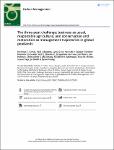The three-peat challenge: business as usual, responsible agriculture, and conservation and restoration as management trajectories in global peatlands
| dc.contributor.author | Girkin, NT | |
| dc.contributor.author | Burgess, PJ | |
| dc.contributor.author | Cole, L | |
| dc.contributor.author | Cooper, HV | |
| dc.contributor.author | Honorio Coronado, E | |
| dc.contributor.author | Davidson, SJ | |
| dc.contributor.author | Hannam, J | |
| dc.contributor.author | Harris, J | |
| dc.contributor.author | Holman, I | |
| dc.contributor.author | McCloskey, CS | |
| dc.contributor.author | McKeown, MM | |
| dc.contributor.author | Milner, AM | |
| dc.contributor.author | Page, S | |
| dc.contributor.author | Smith, J | |
| dc.contributor.author | Young, D | |
| dc.date.accessioned | 2023-11-23T13:02:07Z | |
| dc.date.available | 2023-11-23T13:02:07Z | |
| dc.date.issued | 2023-12-31 | |
| dc.identifier.issn | 1758-3004 | |
| dc.identifier.issn | 1758-3012 | |
| dc.identifier.other | ARTN 2275578 | |
| dc.identifier.uri | https://pearl.plymouth.ac.uk/handle/10026.1/21686 | |
| dc.description.abstract |
Peatlands are a globally important carbon store, but peatland ecosystems from high latitudes to the tropics are highly degraded due to increasingly intensive anthropogenic activity, making them significant greenhouse gas (GHG) sources. Peatland restoration and conservation have been proposed as a nature-based solution to climate change, by restoring the function of peatlands as a net carbon sink, but this may have implications for many local communities who rely on income from activities associated with transformed peatlands, particularly those drained for agriculture. However, without changing the way that humans interact with and exploit peatlands in most regions, peatlands will continue to degrade and be lost. We propose that there are ultimately three potential trajectories for peatland management: business as usual, whereby peatland carbon sink capacity continues to be eroded, responsible agricultural management (with the potential to mitigate emissions, but unlikely to restore peatlands as a net carbon sink), and restoration and conservation. We term this the three-peat challenge, and propose it as a means to view the benefits of restoring peatlands for the environment, as well as the implications of such transitions for communities who rely on ecosystem services (particularly provisioning) from degraded peatlands, and the consequences arising from a lack of action. Ultimately, decisions regarding which trajectories peatlands in given localities will follow torequire principles of equitable decision-making, and support to ensure just transitions, particularly for communities who rely on peatland ecosystems to support their livelihoods. | |
| dc.format.extent | 2275578- | |
| dc.language | en | |
| dc.publisher | Informa UK Limited | |
| dc.subject | Nature-based solutions | |
| dc.subject | peatland | |
| dc.subject | land sharing | |
| dc.subject | land sparing | |
| dc.subject | greenhouse gas emissions | |
| dc.subject | net zero | |
| dc.title | The three-peat challenge: business as usual, responsible agriculture, and conservation and restoration as management trajectories in global peatlands | |
| dc.type | journal-article | |
| dc.type | Review | |
| plymouth.issue | 1 | |
| plymouth.volume | 14 | |
| plymouth.publication-status | Published | |
| plymouth.journal | Carbon Management | |
| dc.identifier.doi | 10.1080/17583004.2023.2275578 | |
| plymouth.organisational-group | |Plymouth | |
| plymouth.organisational-group | |Plymouth|Faculty of Science and Engineering | |
| plymouth.organisational-group | |Plymouth|Faculty of Science and Engineering|School of Geography, Earth and Environmental Sciences | |
| plymouth.organisational-group | |Plymouth|REF 2021 Researchers by UoA | |
| plymouth.organisational-group | |Plymouth|Users by role | |
| plymouth.organisational-group | |Plymouth|Users by role|Academics | |
| plymouth.organisational-group | |Plymouth|REF 2021 Researchers by UoA|UoA14 Geography and Environmental Studies | |
| plymouth.organisational-group | |Plymouth|REF 2028 Researchers by UoA | |
| plymouth.organisational-group | |Plymouth|REF 2028 Researchers by UoA|UoA14 Geography and Environmental Studies | |
| dcterms.dateAccepted | 2023-10-19 | |
| dc.date.updated | 2023-11-23T13:02:06Z | |
| dc.rights.embargodate | 2023-11-24 | |
| dc.identifier.eissn | 1758-3012 | |
| rioxxterms.versionofrecord | 10.1080/17583004.2023.2275578 |


